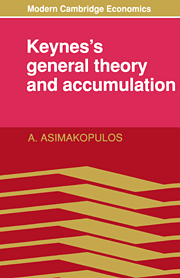Book contents
- Frontmatter
- Contents
- Series preface
- Preface
- 1 Introduction
- 2 Towards The General Theory
- 3 The General Theory of employment
- 4 Consumption and investment
- 5 Money, finance and the rate of interest
- 6 Equilibrium, change and time
- 7 Harrod and dynamic economics
- 8 Robinson on the accumulation of capital
- 9 Conclusion
- References
- Indexes
7 - Harrod and dynamic economics
Published online by Cambridge University Press: 24 October 2009
- Frontmatter
- Contents
- Series preface
- Preface
- 1 Introduction
- 2 Towards The General Theory
- 3 The General Theory of employment
- 4 Consumption and investment
- 5 Money, finance and the rate of interest
- 6 Equilibrium, change and time
- 7 Harrod and dynamic economics
- 8 Robinson on the accumulation of capital
- 9 Conclusion
- References
- Indexes
Summary
INTRODUCTION
R. F. Harrod's attempt to move economic theory in a direction that would encompass dynamic models was based on ideas that pre-dated The General Theory. It stemmed from the view that a correct analysis of cyclical phenomena cannot take as the starting point a position of static equilibrium. These phenomena ‘should be regarded as oscillations around a line of steady growth, (Harrod 1951: 261), and he tried to deal with them in this way in his 1936 book entitled The Trade Cycle: An Essay. This book's genesis was independent of The General Theory, and had as its central idea the interaction of J. M. Clark's accelerator with Kahn's ‘multiplier’ and it tried to show that the business cycle is one aspect of the growth process. But Harrod had not yet arrived at his ‘fundamental growth equation’, which he was to use to generate his equilibrium path of steady advance. He recalled that this equation ‘came to me in a flash on a particular day … In the course of my “reflections” I suddenly saw it in a split second … in July 1938’ (Harrod 1973: 41). That Harrod then quickly wrote his basic paper on dynamic theory, which was published in March 1939, is evident from his 3 August, 1938 letter to Keynes that included the announcement: ‘I have just finished writing my re-statement of the “dynamic” theory, which is, I think, a great improvement on my book’ (Keynes 1973c: 301).
- Type
- Chapter
- Information
- Keynes's General Theory and Accumulation , pp. 138 - 165Publisher: Cambridge University PressPrint publication year: 1991



